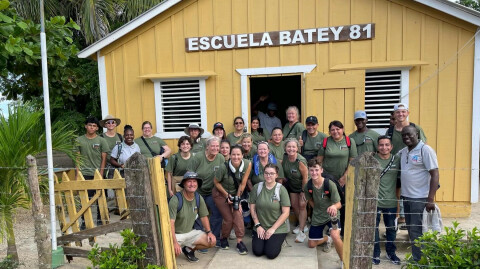TLDR: An object lesson on marriage yields interesting results and leads a youth pastor to some wise thoughts about marriage… and eggs.
Many years ago, in a church of a different denomination, there was a youth pastor who decided to teach a lesson on marriage to his youth group. He marked a number of eggs with invisible dye and gave them to the youth to take home for a week. After a week, the kids returned to the youth group with the eggs and that’s when things got a bit complicated. Three of the eggs were found to be counterfeit, when exposed to the black light. The kids admitted that they had broken the eggs at some point during the week and had replaced them with house eggs. The pastor then talked about divorce. The new eggs were nice, but they were not as special as the eggs God had given them originally. The duty of every Christian is to return to God with the original egg God gave them, because biblical marriage is meant to be life-long, monogamous, and singular.
A number of eggs looked absolutely perfect, just as good, if not better than when the pastor had given them to the kids. When interviewed, those kids admitted that they placed them lovingly in a dresser until next week’s class because they didn’t want to break them. The pastor asked, “And what did you learn from your time with the egg during the week?” He then spoke about marriage as a process of discovery of the other and of self-discovery. Relationship building requires time spent with each other, and without time, no relationship will ever grow. They learned nothing about themselves and the egg because they spent no time with the egg.
Two kids brought the eggs completely broken in small saucers. One of the eggs had been smelling like rotten cabbage for two days, but the youth had not wanted to throw it away. The youth admitted that they had not taken proper care of the egg. One had it in his back pocket and sat on it, the other dropped the egg as he was jumping on his bed. The pastor spoke about carelessness that often causes love and relationships to die. You take each other for granted and forget the other is there. You take unnecessary risks which cause harm to the other. You fail to protect the other as you ought to. As a result, love gets hurt and sometimes dies.
Two of the kids spent time with the egg, bringing it to every activity they did and refusing to engage in social activities where the eggs might not be safe (Like sports practices, parties with friends, and even serving in church.) The shell of the eggs had darkened a bit, and the youth had learned a great deal from the experience. Caring for something takes a lot of time and sacrifice. In fact, there was so much effort in caring for the egg that by the end of the week they were sick and tired of the eggs. They were outright resentful of the egg and the youth pastor. One of the youth even contemplated moving to a different church. “It was plain hell. If this is what it means to get married, I will die single,” one of the kids complained, and he reported that his parents had an appointment with the Senior Pastor the following Tuesday. Unfaced by the complaints, the youth pastor talked about enmeshment and lack of boundaries. Some people lose their own identities and what makes them unique when they enter into relationships. They lose all sense of who they are, and soon begin to feel they have no life outside of the other person. Sometimes, this brings a sense of security, but often it brings resentment and bitterness. Many people live in loveless marriages out of a sense of obligation and give up pleasures and activities that once made them happy. Proper care of the other requires proper care of the self. Without self-love no person can truly love another.
One youth admitted that the same afternoon as the youth group, he felt hungry and ate the egg. The youth pastor said, “Next!” This left a teen girl who admitted to leaving the egg at home during school hours, taking care of it during the evenings and early mornings, and giving it to the care of her mom when she had swimming lessons and gymnastics. She admitted that leaving the egg made her feel guilty sometimes, but she was always happy when she saw it again. Soon she learned ways of keeping the egg safe when taking it outside of the house. In fact, taking the egg with her to various activities made her happy because she challenged herself to spend as much time with it and still keeping it safe. Towards the end of the week, she was so used to the egg that she felt sad giving the egg back to the youth pastor. The experience was so rewarding that she had chosen to remain single and become an egg farmer when she grew up. She just couldn’t think anyone could ever bring her as much joy as the egg. The youth pastor used the opportunity then to announce he had taken a job with Starbucks and today would be his last Sunday.
This last phrase is false. He discovered the Episcopal Church during college and eventually became a priest. But after the last girl’s report, the pastor spoke about hard work, fidelity, making adjustments along the way, forgiveness of self and the other, and devotion as important qualities in marriage. He once again encouraged spending time and prioritizing the other as important activities that allow love to grow and marriages to become strong.
Absent from the lesson is the fact that spouses are not eggs and don’t behave like eggs. They are partners, companions, accountability coaches, instruments of growth, lovers, and friends. I do believe his thoughts on time and prioritizing the other are very smart. I hope you will have a happy Valentine’s week. I am praying for all of our couples today.
May God continue to bless you,
Fr. Roman+





